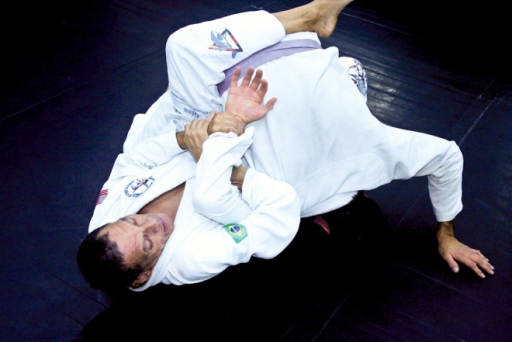Second time I'd done the leg hook takedown, and there weren't many notes to take away from this one, I find this technique fairly straight forward to pull off well, I just need to get some reps in to improve my landing/attaining the mount more smoothly. In time!
The Kimura though, first time I'd done this technique at this academy, and for the most part, it's exactly the same as how I'd learned it previously. There are 3 variations in this technique from the guard; the basic application (which isn't really a variation, but more just to familiarise you with how this submission is generally done), the rider variation, and the forced variation.
The rider variation starts with your opponent down in your closed guard (head low and controlled). The indicator is your opponent putting their hands on the ground and pushing, like doing a pushup, in order to sit upright. You follow, or 'ride', them up, maintaining closeness, then you scoot your hips out and trap their arm/wrist in the Kimura grips. This is challenging to describe in writing, but this type of hand and wrist positioning seems to occur commonly through a variety of positions and submissions in BJJ, the 'figure 4' or 'Americana' or 'keylock', and various other armlock set ups from different positions, including of course the Kimura, (and even footlock grips later on!), involve this same set of grips; holding your opponent's wrist, and then looping around that limb with your other arm, and grabbing your own wrist. The image I've attached is of Relson Gracie with the Kimura from the guard locked up.

The indicator for the forced variation is for if your opponent, when low in your closed guard, for whatever reason (perhaps exhaustion?), is stationary, and with their weight forward/high, but otherwise inactive. You sort of stuff their head under/behind your tricep, in a similar way as to if you are setting up a guillotine choke from the guard, scoot your hips out to the side that their head is on, and that scoot makes the space and angle to be able to lock up the Kimura grips on their arm/wrist. In applying it, you look up to the ceiling, and as you lie back down to the ground, use your foot on the side of the locked up arm to trap their calf, so that they can't just walk their legs around to that side and pass your guard/nullify the Kimura. For the purpose of partner safety, touch their locked up arm to their belt, walk your hip and shoulder away from them a little, then lock up your feet around them like you have closed guard, but you'll be side-on to them now. You squeeze/scissor your legs together, and then this was a killer detail which got pointed out to me which I never knew before! - to apply the actual submission, you try to bring your own elbow down to touch the ground; the elbow of the arm which is holding your own wrist in the Kimura, the one threaded over the top of their tricep. This simple little movement was that magical leverage point which you occasionally discover in BJJ which takes the application of a submission from being a matter of centimetres, to a matter of millimetres! It came on instantaneously and effortlessly with this little detail, and it's these details which are probably the thing I love most about the art of BJJ, the details which make it seem like magic or a superpower or something haha. Alavanca!
Cheers,
- David
Congratulations @davidrichards! You have completed some achievement on Steemit and have been rewarded with new badge(s) :
Click on the badge to view your Board of Honor.
If you no longer want to receive notifications, reply to this comment with the word
STOPTo support your work, I also upvoted your post!